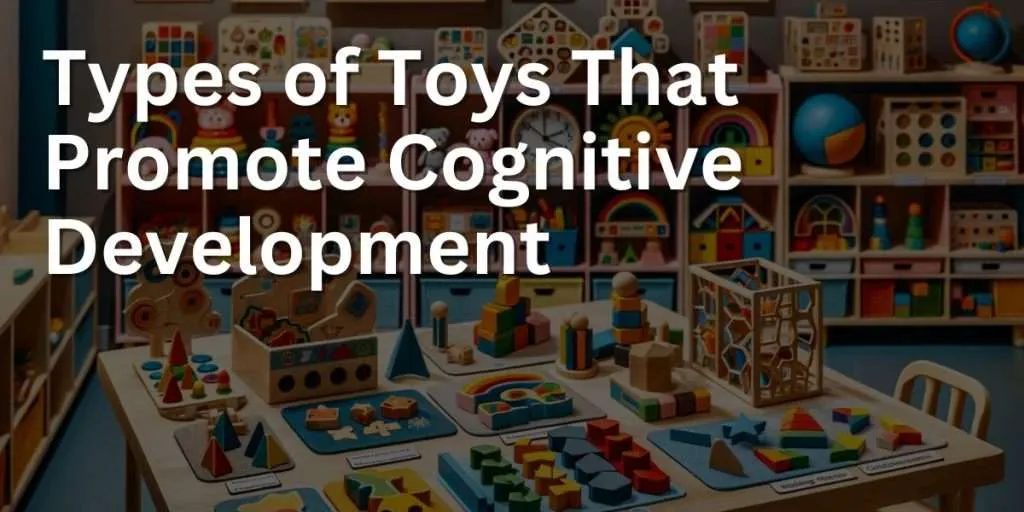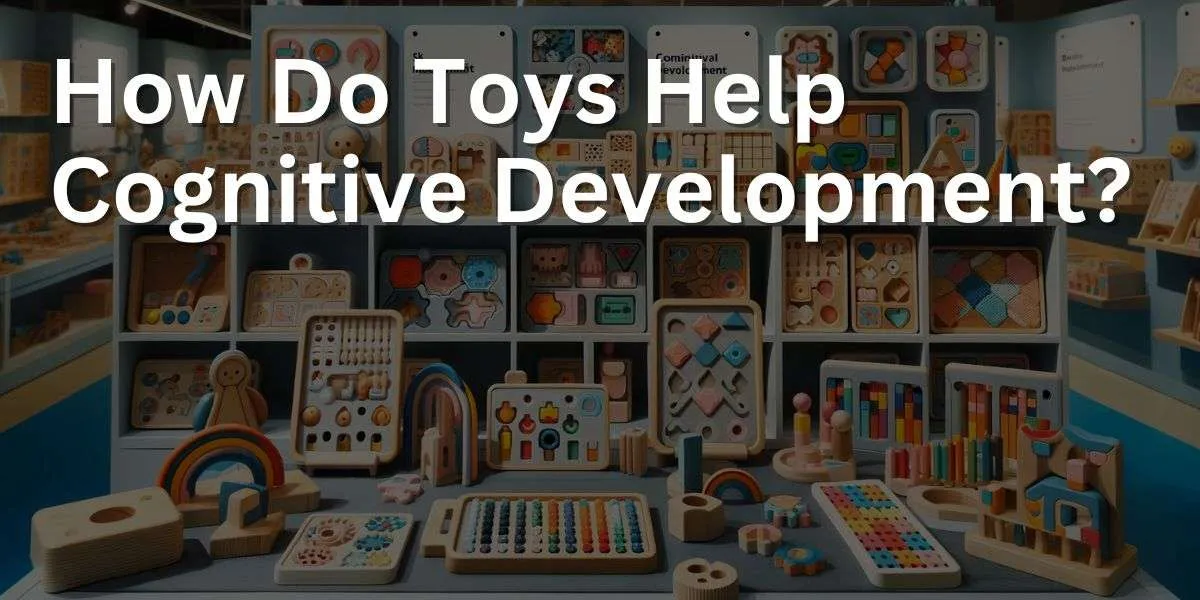Understanding How Toys Help Cognitive Development is crucial for parents and educators aiming to enrich a child’s learning environment. Toys are not mere trinkets; they are tools that shape thinking, perception, and problem-solving skills.
In this insightful article, we’ll delve into the role toys play in cognitive development, from the sensory-rich experiences for infants to the complex puzzles that challenge older children. We’ll examine how different types of toys can influence memory, coordination, language acquisition, and spatial reasoning.
Join us as we unpack the science behind playtime and reveal how the right toys can set the foundation for a lifetime of learning.
Key Takeaways on Toys for Children’s Cognitive Development
- Toys stimulate creativity: Engaging with toys sparks imagination, leading to the enhancement of creative thinking in children.
- Play promotes problem-solving skills: Through interactive play with toys, children learn to solve problems, boosting their cognitive development.
- Toys encourage social interaction: Cooperative play with toys among peers develops social skills and emotional understanding.
- Educational toys enhance learning: Toys designed with an educational purpose can make learning fun and improve academic skills.
- Physical toys improve motor skills: Manipulating toys helps in the development of fine and gross motor skills in children.
- Role-playing toys teach empathy: Toys that encourage role-play help children understand and emulate social roles, fostering empathy and social awareness.
- Toys with multisensory features aid memory: Toys that engage multiple senses can aid in memory retention and sensory processing skills.
How Do Toys Help Cognitive Development
Toys play a pivotal role in facilitating cognitive development in children, acting as tools that stimulate and challenge young minds. They serve as key agents in supporting and enhancing various aspects of mental growth.
Through the lens of semantic triple syntax, the relationship between toys, children, and cognitive development becomes clear: toys engage children, children interact with toys, and interaction promotes cognitive development.
Engagement with toys sparks curiosity and exploration, a foundation for learning. Children discover new concepts and test hypotheses, leading to cognitive advancements in understanding cause and effect.
Toys encourage problem-solving skills, as children manipulate them to achieve desired outcomes. This manipulation requires planning and strategy, which are critical thinking components.
Memory and recall are exercised when children remember rules or sequences of play, strengthening neural pathways. This exercise of memory enhances both short-term and long-term cognitive capacities.
Language development is supported by toys that require naming, describing, and discussing. The requirement for verbal expression during play enhances vocabulary and language fluency.
Social toys promote cooperative play and perspective-taking, essential for social cognition. These toys facilitate the understanding of others’ thoughts and feelings, a skill crucial for emotional intelligence.
Creativity and imagination are unleashed as toys provide the means for children to create narratives and build worlds, fostering divergent thinking and innovation.
- Skill Enhancement: Toys like puzzles and building blocks promote the development of problem-solving and logical thinking skills.
- Memory Boost: Memory games or toys that require recall enhance short-term and long-term memory skills.
- Sensory Stimulation: Toys with different textures, colors, and sounds stimulate the senses, promoting sensory integration.
- Language Development: Dolls, action figures, and other role-playing toys encourage children to communicate, expanding their vocabulary and language comprehension.
- Hand-Eye Coordination: Toys that require precise hand movements, like bead threading or stacking rings, develop hand-eye coordination.
- Spatial Awareness: Construction toys and puzzles help children understand spatial relations and dimensions.
- Creativity Stimulation: Toys like art sets or play-dough allow children to express themselves creatively, fostering imaginative thinking.
- Cause and Effect: Toys that respond to actions (e.g., press a button to produce a sound) teach children about cause and effect relationships.
- Math Skills: Counting toys or those with shapes and patterns introduce basic math concepts.
- Focus and Attention: Many toys require sustained attention to complete a task, thereby improving concentration levels.
- Sequencing Skills: Toys that require a specific order or sequence, like some board games or story cards, enhance understanding of order and progression.
- Categorization: Toys with multiple parts or types allow children to sort and categorize, laying a foundation for scientific thinking.
- Enhances Curiosity: Interactive and discovery toys stimulate a child’s natural curiosity, encouraging explorative learning.
- Promotes Problem-Solving: Many toys present challenges, allowing children to think critically and find solutions.
- Social Cognition: Board games and team-play toys help children understand social cues, turn-taking, and cooperative play, enhancing social cognition.
Toys and Piagets Theory of Cognitive Development
Toys play a pivotal role in cognitive development, resonating with Piaget’s Theory, which emphasizes learning through play and discovery.
Sensorimotor toys align with Piaget’s initial stage, enhancing infants’ sensory experiences and motor skills. These toys encourage exploration through touch, sound, and movement.
Preoperational toys cater to toddlers and young children, sparking imagination and symbolic thinking. Playsets and role-playing games allow children to practice language and storytelling, crucial for cognitive growth.
Concrete operational stage toys are puzzle-based and logic-driven, aiding in the development of problem-solving skills and the understanding of cause and effect.
Formal operational toys are suitable for older children, involving strategy and hypothetical thinking, which align with the development of abstract reasoning.
Interaction with toys allows children to assimilate new information, accommodating it into existing schemas, a fundamental aspect of Piaget’s theory.
Toys also serve as tools for social interaction, which is key to cognitive development, allowing children to learn from peers and navigate different perspectives.
Through play, children test hypotheses and learn from their outcomes, advancing their cognitive abilities in line with Piaget’s stages of development, nurturing their growth in a natural, engaging manner.

Types of Toys That Promote Cognitive Development
Here are the different toys that promote child’s development:
| Type of Toy | Cognitive Benefits |
|---|---|
| Puzzles | Enhance problem-solving skills, improve memory, and boost spatial reasoning. They also promote attention to detail and concentration. |
| Building Blocks | Foster creativity, spatial awareness, and logical thinking. Experimenting with balance and symmetry can also introduce basic physics concepts. |
| Board Games | Improve strategic thinking, memory, and problem-solving. Many games also involve counting, pattern recognition, or matching, aiding in mathematical understanding. |
| Role-Playing Toys | (e.g., dolls, action figures, playsets) Support abstract thinking, creativity, and the ability to view situations from multiple perspectives. |
| Craft Supplies | (e.g., crayons, paint, clay) Encourage creativity and innovation. Also, they help in refining motor skills which are closely linked to cognitive processes. |
| Books | Boost language skills, comprehension, and imagination. Reading or being read to also enhances vocabulary and general knowledge. |
| Science Kits | Introduce children to the scientific method, cause and effect, and hypothesis testing. They also foster curiosity and exploration. |
| Math Toys | (e.g., abacus, counting toys) Improve numerical skills, understanding of quantities, and basic mathematical operations. |
| Memory Games | Enhance memory recall, concentration, and attention to detail. |
| Musical Instruments | Foster understanding of rhythm, patterns, and sequences. Music also aids in mathematical and spatial-temporal reasoning. |
| Interactive Electronic Toys | Can be designed to challenge various cognitive skills, including problem-solving, logic, and pattern recognition. |
| Art Supplies | Encourage creativity, self-expression, and observation. Interpreting and creating art can also enhance critical thinking. |
See out guides to the best cognitive toys for babies and the best cognitive toys for preschoolers
Factors to Consider When Choosing Toys for Cognitive Development
Selecting toys for cognitive development involves considering multiple factors that align with a child’s age, interests, and developmental stage, ensuring a beneficial and enjoyable learning experience.
Age-appropriateness of toys equates to suitable challenges for a child’s cognitive abilities. Ensuring that toys match a child’s developmental stage supports appropriate skill advancement.
Interest alignment of toys with a child’s passions ensures sustained engagement. A toy that captures a child’s imagination will more likely be a conduit for learning.
Educational value is paramount, as toys with this attribute directly foster cognitive skills like problem-solving, memory, and critical thinking.
Multi-sensory features in toys stimulate various senses, aiding in the development of perceptual abilities. Toys that offer visual, auditory, and tactile feedback encourage comprehensive sensory processing.
Versatility of toys to grow with the child adds long-term value, as they can be used in different ways at various developmental stages.
Social interaction potential in toys that encourage sharing and cooperation support social cognitive skills. Such toys enhance understanding and empathy.
Safety and durability ensure that the toy can be explored without risk, making the learning environment secure and consistent.
By prioritizing these factors, caregivers can provide toys that are not only safe and engaging but also significantly contribute to the cognitive enrichment of children.
Maximize the Benefits of Playing with Toys for Cognitive Development
Maximizing the benefits of playing with toys for cognitive development involves strategic choices and engagement techniques to enhance learning outcomes.
Active participation of caregivers during playtime increases the educational value of toys. This engagement allows for guided learning and reinforces cognitive concepts.
Varied selection of toys introduces a breadth of cognitive challenges. A diverse toy collection stimulates different aspects of cognitive development, from fine motor skills to problem-solving.
Regular rotation of toys maintains a child’s interest and curiosity. Introducing toys in intervals keeps the learning environment fresh and challenging.
Creating a conducive play environment free of distractions allows children to focus and delve deeper into play, which is crucial for attention and concentration skills.
Setting goals for play sessions can help in tracking developmental progress. These goals provide structure and a sense of accomplishment as new skills are mastered.
Encouraging self-directed play fosters independence and creativity. When children lead their play, they make discoveries and learn at their own pace.
Integration of educational toys into other activities bridges play and real-life learning. Toys that mimic real-world objects and scenarios can enhance understanding and application of concepts.
By employing these methods, the cognitive benefits derived from toys are amplified, fostering a rich and versatile learning experience for children.
FAQs on Great Toys for Children’s Development
What Skills Do Toys Help Develop?
Children learn through play and toys should be a huge part of children play of all ages. Cognitive skills such as problem solving ability, memory, and creativity are enhanced through the use of toys that require active participation from toddlers.
Social-emotional development like empathy, cooperation, and communication can be developed by playing with other children or engaging in pretend play.
Physical development is also encouraged through toys that promote physical activity like balls and blocks. Language skills are improved when children interact with educational toys that introduce new words and concepts.
Toys provide the child with an important foundation for learning and growth throughout early childhood.
What Children’s Toys That Promote Cognitive Development Among Infants?
Great toys have a great benefit of promoting cognitive growth through improvement of neural synapses (or brain cell connections) that process information in the brain through infancy.
Such toys can include those that encourage exploration of the world around them and problem solving, such as puzzles or shape sorters.
Active play and musical instruments are also beneficial for helping babies learn to recognize sounds and rhythms. Toys with bright colors, textures, and patterns help infants develop visual recognition skills.
Storytelling toys and infant books with simple stories can be used to introduce language concepts like rhyming words or counting numbers. It also help expand a child’s imagination.
Interactive toys like pop-up books or talking dolls provide opportunities for social interaction and communication development for children at a young age.
Overall, play with toys helps improve cognitive skills such as problem-solving, critical thinking, and creativity, thereby facilitating cognitive development in children.





